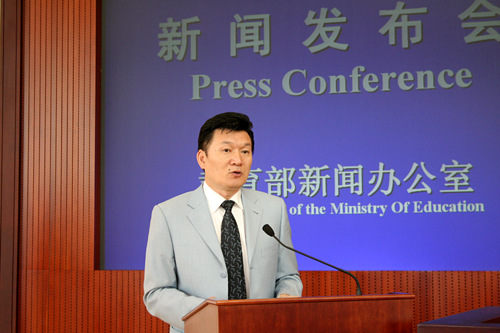Be human first
In an open letter about Wang Yongping after the press conference, Wang Xuming explicitly criticized his remarks as being cold and lacking humanity.
Wang Xuming stressed that spokesmen should be human beings in the first place. "In my opinion, spokespersons should at least be true, sincere and kind-hearted. These are the basic qualities a person should possess."
Wang Xuming and Wang Yongping are in fact friends and former classmates, who trained together to be China's first group of government spokespersons.
However, Wang Xuming pointed out that the letter was not aimed at Wang Yongping personally. "If there had been no press conference about the collision, I could have never drawn the public's attention to our country's information disclosure system," he explained in a television interview with Xu Gehui.
"Because of the incident, people became interested in press conferences, spokespersons and the system. But there are lots of misunderstandings. Therefore, I wanted to take the chance to discuss with them about what kind of spokesmen we really need and what a spokesperson should do," he added.
Wang analyzed that spokespersons in China are now mired in an embarrassing situation. "For example, people always think that spokesmen should know everything and answer every question, so they throw stones at them for any sign of ignorance or if they are silent," he noted, adding that spokesmen are in fact authorized to perform limited duties.
"In the high-speed train incident, people were angry at not only the spokesperson but also the ministry, which did not cope with the disaster properly. The spokespersons are just a target for the public's anger," he explained.
Duty vs. profession
Wang Xuming compared China's information disclosure system to that of Western countries, summarizing that in China being a spokesperson is a duty, while in foreign countries it is a profession.
"Abroad, related qualifications are required to become a spokesperson, who will then be praised for good performances and punished for mistakes. However, in China, there are no such occupational standards. I became a spokesperson mainly because it was the duty of a vice director of a department in the MOE, not because I was qualified. If I was transferred to another position, I had to quit as a spokesperson," he said.
According to Zhou Qingan, a researcher at the International Communication Center of Tsinghua University, most Chinese government spokespersons are officials with no other career backgrounds.
"In Europe and the U.S., government spokespersons are generally allowed to attend the most top-level decision-making conferences to gain a better understanding of related policies," noted Shi Anbin, a professor at the School of Journalism and Communication at Tsinghua University, adding that in China spokespersons are restricted by their official ranks, and are not able to get to know an event comprehensively.
Yet Wang Xuming is hopeful for the future. "The State Council issued the Regulation of the People's Republic of China on the Disclosure of Government Information years ago. I believe that in a couple of years, more information will be open to the public. Right now, information disclosure is a matter of legality, instead of the willingness of officials or government departments," he explained.


















